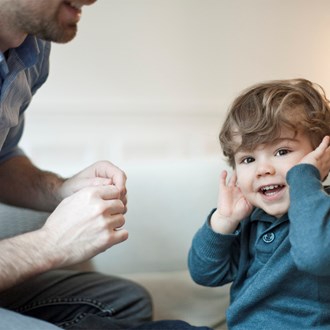Uh-oh! What to do when your toddler swears

Most toddlers have a cheeky side, but how do you handle it when yours starts swearing?
By Ian Wallace
Child psychologist / June 21 2016
‘Out of the mouths of babes!’ It’s an old proverb, but still very true. Toddlers are insightful and honest, but they can also be unintentionally rude, while some will start swearing or refusing to use their good manners. Either way, it is a challenging period for parents.
Sometimes toddlers can come across a bit blunt, but the truth is, they simply aren’t tactful yet. Your toddler might exclaim in the bank queue, “Mummy, that lady is really fat, why is she eating lollies?” It’s important to recognise that your toddler may not be deliberately malicious. Younger toddlers just haven’t yet developed conceptual social conscience. Unless they’ve been repeatedly taught, they’ll often comment honestly on what they observe.
How do you react?
It might be tempting to disappear into the queue, or to ignore your toddler’s disrespectful comment. However, this isn’t effective. While it is not a time for punishment, it is a time for social teaching. You need to be clear, confident and firm that it is not nice, nor acceptable to say mean things. Try to enforce simple social concepts, such as, we try to say nice things, not things that might make people sad or upset.
Toddlers also understand more through their own perspective. It is a good time to help them reflect, as to whether they would like someone saying that about them, or suggest, if you wouldn’t like it, then don’t say it about others.
Managing manners
Teaching manners is very important, too. Toddlers are too immature and socially unaware to grasp the need to show good manners, so they need this explained and they need to be praised and given recognition for using good manners. Obviously, this starts with good role modelling. You can’t expect your toddler to show good manners, if you push into lines or comment rudely about others. Not surprisingly, the most polite toddlers get ahead socially and make better friends as they mimic their polite, pleasant and well-mannered parents.
Most toddlers will also go through a period of acting-out and may start swearing. At around age four, toddlers often become fixated with ‘potty’ humour. During this time you are more likely to be called things like a ‘poo head’. At this age toddlers typically hear other older kids swearing, which they mimic. While simply ignoring it is promoted as a solution, it rarely works long-term.
Naughty words
Initially, ignoring the first few swear words can be effective, as some toddlers just do it for a reaction. If swearing continues, it is time to take action, but not just harsh punishment. Firstly, embark on a plan or reward system that recognises and rewards using nice words, being polite and showing good manners. Combine this with ensuring that you are equally being polite and not swearing. You can’t expect your toddler to seek rewards for being polite and showing good manners if you practise the opposite behaviour.
Balance positive recognition and reward with a non-emotive, non-engaging reaction, and be firm and consistent. Try not to overreact, or you might feed the need for a reaction and show how powerful swearing can be. Simply act a little dismissive, such as, “...oh swearing again, that’s not okay, guess that means toys go away now”. If your toddler is playing or interacting with others, being rude should mean a brief time-out.
Praise politeness
Don’t just make it a punishment, though. After a few minutes of time-out, discuss it, then go back and practise good manners and nice talking. Praise and reward the improvement, as well as showing your toddler how being nice and polite works, such as everyone is playing nicely and getting on now, having fun.
Of course, a few toddlers delight more in being naughty. If this is the case, you need to be a little more firm, but not too reactive. We often set up simple, structured programs in these cases, such as being impolite or swearing loses points - three lost points means no digital devices for the morning. You need to remove your toddler from the environment, even if this results in a tantrum. Deliberately rude toddlers delight too much in controlling the environment and watching everyone’s reactions.
Apology accepted
It is also important to teach your toddler to say sorry. At first kids will simply say sorry to avoid being in trouble. However, toddlers gradually realise that outcomes are better, both for the victim and for themselves, if they genuinely apologise.
Toddlers take time to learn to be polite and to use good manners. It takes good role modelling, plenty of patience and positive recognition to get through this troubling stage of development.






